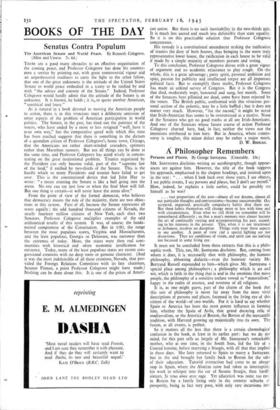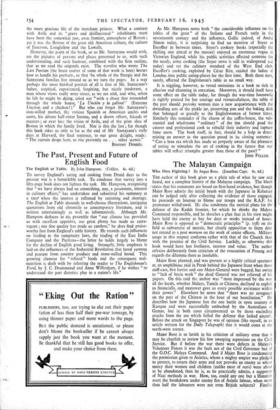A Philosopher Remembers
Persons and Places. By George Santayana. (Constable. 10s.)
MR. SANTAYANA disclaims writing an autobiography, though appear- ances are against him. However, the title of the book suggests his approach, emphasised in the chapter headings, and insisted upon in the text: " . . . when I look back over those years, I see objects, I see public events, I see persons and places, but I don't see myself." How, indeed, he explains a little earlier, could he possibly see himself as he was?
. . . vast proportions of the past—almost all our dreams, almost all our particular thoughts and conversations—become unrecoverable. Our accepted, organised, practically compulsory habits shut them out. But these habits themselves will change more or less with time and with circumstances. Even what we still think we remember will be remembered differently ; so that a man's memory may almost become the art of continually varying and misrepresenting his past, accord- ing to his interests in the present. This, when it is not intentional or dishonest, involves no deception. Things truly wear those aspects to one another. A point of vieis, and a special lighting are not distortions. They are conditions of vision, and spirit can see nothing not focussed in some living eye.
It must not be concluded from these extracts that this is a philo- sophic work. This, too, Mr. Santayana disclaims. But, coming from whom it does, it is necessarily shot with philosophy, the humane philosophy, abhorring dialectic—even the honester variety Mr. Bertrand Russell expounded to him—which gives Mr. Santayana a speciil place among philosophers ; a philosophy which is art and wit, which is faith in the thing that is and in the emotions that move people, the philosophy of a sensitive recluse vowed to "materialism," happy in the realm of essence, and reverent of all religions.
It is, as one might guess, part of the charm of the book that this sort of philosophy is never far away from the most vivid descriptions of persons and places, focussed in the living eye of -this citizen of the world—of two worlds. For it is hard to say whether Spain or America has been the most potent influence in forming him, whether the Spain of Avila, that grand decaying relic of mediaevalism, or the America of Boston, the Boston of the mercantile tradition, with Harvard growing up majestically into its own. The fusion, at all events, is perfect.
So it matters all the less that there is a certain chronological confusion in the book, at least in its earlier part: but we do not mind, for this part tells us largely of Mr. Santayana's remarkable mother, who at one time, in the South Seas, led the life of a Conrad heroine, before marrying a Sturgis, with all that that implied in those days. She later returned to Spain to marry a Santayana, but in the end brought her family back to Boston for the sake of their education. Tutorial instruction had come to an abrupt stop in Spain, where the Alsatian tutor had taken to interrupting his work to whisper into the ear of Susana Sturgis, then hardly sixteen, 7e vous aime avec rage. Yet education was none too east in Boston for a family living only in the remoter suburbs of prosperity, being in fact very poor, with only rare incursions into
the more gracious life of the merchant princes. What a contrast with Avila and its "grave and disillusioned" inhabitants must have been the somewhat raw, even frontier, atmosphere of Boston ; yet it was the Boston of the great old American culture, the culture of Emerson, Longfellow and the Lowells.
However, the point of the book, or so Mr. Santayana would wish, are the pictures of persons and places presented to us, with such understanding, and such humour, combined with the firm outline, that as we lead the originals exist. The novelist who wrote The Last Puritan (the brute matter of some of that work is here) knows how to handle his portraits, so that the whole of the Sturgis and the Santayana families live around us as we turn the pages. In a way perhaps the most finished portrait of all is that of Mr. Santayana's father, sceptical, experienced, forgiving, but nicely intolerant, a man whose views really were views, as we are told, and who, when he felt he might be dying, cried out- " with a shout that resounded through the whole house, ' La Uncion y la gallinaP (Extreme Unction and a chicken!)." But who can forget Mr. Santayana's iron-willed mother, the various Spanish or American uncles and aunts, his devote half-sister Susana, and a dozen others, friends or masters ; or ever lose the vision of Avila, and of the grim slice of Boston in which the family lived. Nor is this the last ; for though this book takes us only as far as the end of Mr Santayana's early days at Harvard, the final sentence, to our great delight, reads : "The curtain drops here, to rise presently on . . . other scenes."
BONAMY DOBREE.



























 Previous page
Previous page